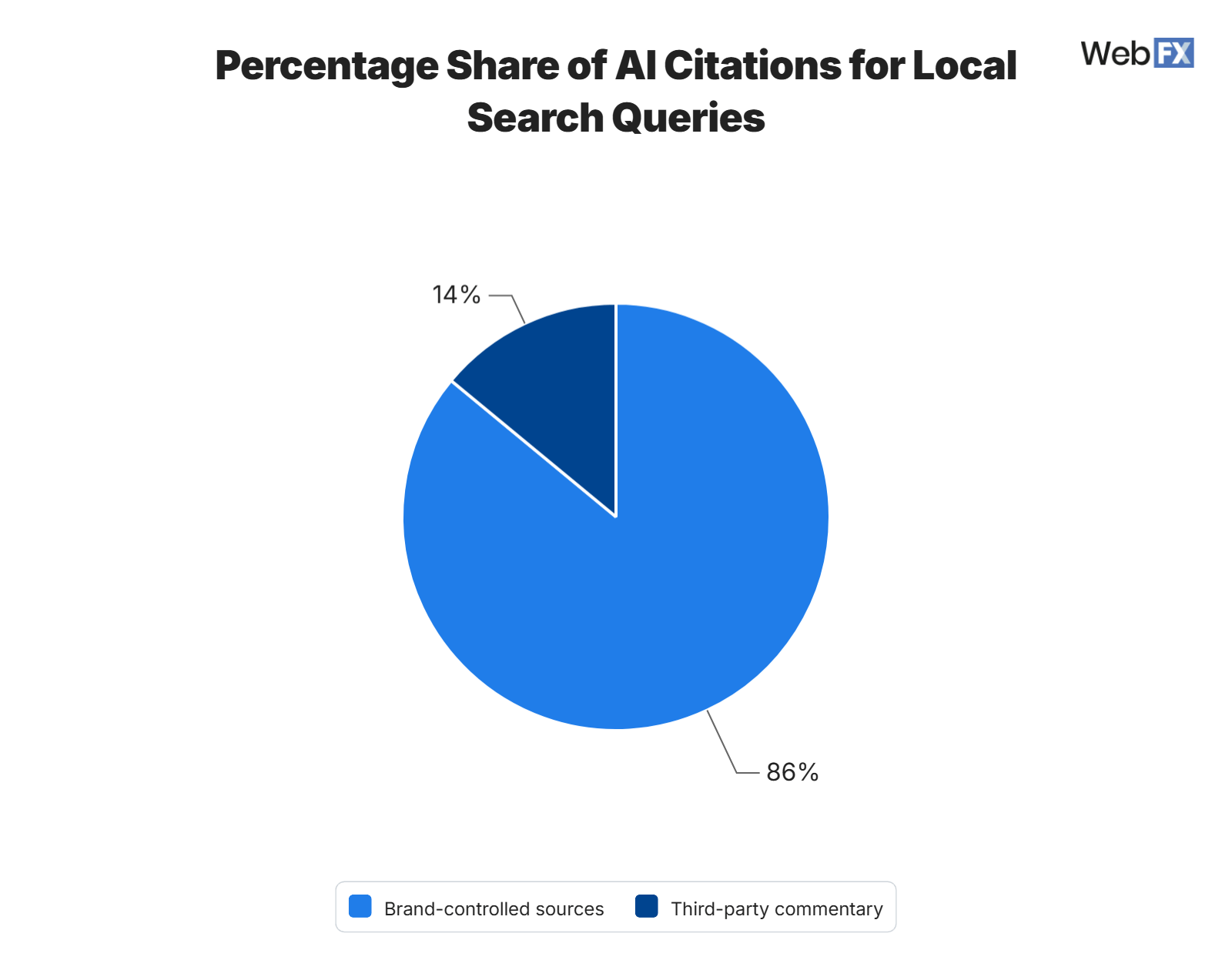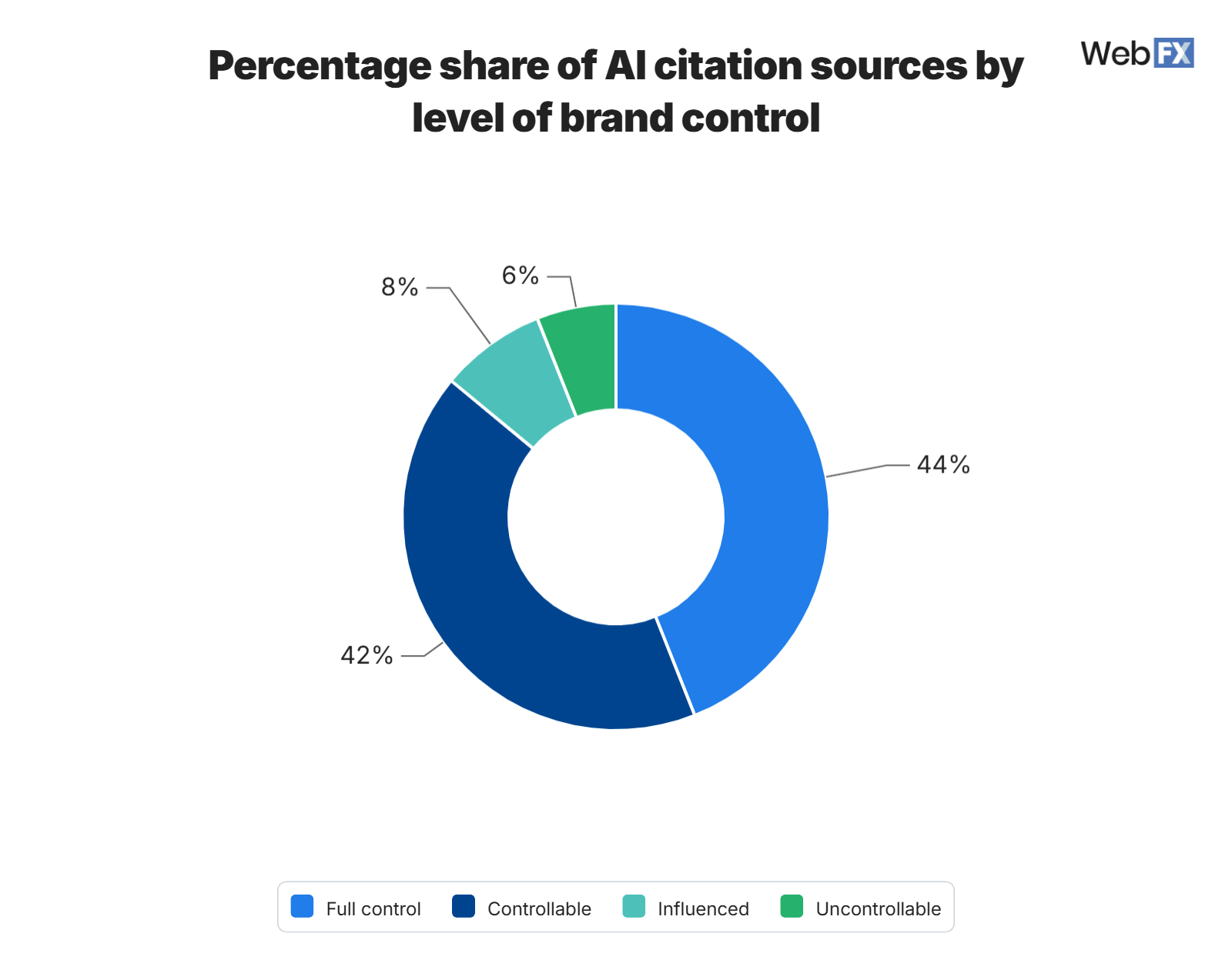-
 Published: Nov 7, 2025
Published: Nov 7, 2025
-
 9 min. read
9 min. read
-
Summarize in ChatGPT
-
 Thaakirah Abrahams
Thaakirah Abrahams WebFX Editor
WebFX Editor
- Thaakirah Abrahams is a Marketing Editor at WebFX, where she leverages her years of experience to craft compelling website content. With a background in Journalism and Media studies and certifications in inbound marketing, she holds a keen eye for detail and a talent for breaking down complex topics for numerous sectors, including the legal and finance industries. When she’s not writing or optimizing content, Thaakirah enjoys the simple pleasures of reading in her garden and spending quality time with her family during game nights.
-
Where do local AI answers really come from?
A groundbreaking Yext study reveals that for location-specific searches, 86% of AI citations come from brand-influenced sources you can control, such as your own website and business listings. -
How can you build a winning local AI citation strategy?
The AMP method provides a blueprint for success by focusing on Amplifying your website’s authority, Molding your brand narrative across controllable platforms, and Perfecting your strategy through continuous performance analysis. -
How can businesses improve their website’s AI citation potential?
You can amplify your website’s authority by mastering thought leadership, using structured data, targeting conversational search queries, and regularly refreshing content to maintain currency and relevance for AI models. -
How do you control your brand’s story beyond your own website?
You can mold your brand narrative by ensuring your information is consistent and complete on business listings, actively cultivating and responding to reviews, and strategically sharing content on relevant social media platforms. -
How do you ensure your AI citation strategy remains effective over time?
You can perfect your strategy by using tracking tools like OmniSEO® to monitor influential AI citations in your industry and adapting your content plan to capitalize on visibility gaps and new opportunities.
AI search often cites forums and third-party sites for general queries, but local searches behave differently. A Yext study shows that for location-specific queries, the majority of AI citations come from brand-controlled sources—your website, business listings, and social profiles.
This makes local AI citations critical: they shape how your business appears in AI-powered local results. By managing your local AI citation strategy, you can influence which sources AI references and ensure your brand is accurately represented.
Let’s explore the study’s key findings and a framework for building a winning strategy for local AI citations.
What is a local AI citation strategy?
A local AI citation strategy is a business approach that helps companies ensure AI-powered search results for location-based queries point to their own website, listings, and social profiles—so your brand shows up where it matters most.
Introducing the AMP method: Your local AI citation blueprint
So now you know you have control. But knowing you have control and knowing how to strategically wield it are two different things. To bridge that gap, we’ve created a framework to effectively boost your brand’s voice in AI search. We call it the AMP method.
This method serves as your blueprint to turn up the volume on your brand’s authority and make it the go-to source for local queries. The strategy is simple yet powerful:
- Amplify: Amplify your authority on your website.
- Mold: Mold your brand narrative across all controllable and influenced platforms.
- Perfect: Perfect your strategy through continuous performance analysis.
AMP up your local search AI citation strategy with these techniques.
A: Amplify your authority
These five strategies are all about enhancing your website’s authority to make AI models choose your website as the authoritative source for local answers.
1. Improve your site’s crawlability
Before anything else, you want to make sure that you haven’t blocked web crawlers and AI crawlers from accessing your site.
If you are blocking them, web crawlers can’t index and rank your pages, and AI crawlers won’t be able to read your content and share it with AI search engine users.
Check your robots.txt file to see if you’re blocking any bots. If you are, you’ll typically have a disallow tag associated with the bot’s name.

You can also improve crawlability by organizing content into clear, understandable sections and improving your site’s navigation.
2. Master thought leadership
AI likes to cite content that demonstrates relevance, authority, and factual reliability. This creates a need for up-to-date content, thought leadership perspectives, and data-informed insights to grab the attention of AI search engines. Here are four best practices for success:
- Practice topical authority: Focus on writing about specific, niche topics within your industry. Think about what information you want your website to be the go-to for.
- Create in-depth, data-informed content: In your articles, provide information that other articles don’t cover. Provide unique insights, original research, and more comprehensive answers to local queries.
- Cite reputable sources and verifiable data: Build trust with AI models by backing up your claims with credible evidence.
- Develop a unique author voice and credentials: Establish yourself as an expert in the field by cultivating a distinctive voice and including an author bio to validate your experience and skills.
3. Use structured data
Structured data or schema markup is information organized into a specific format, making it easy to scan for both humans and machines. Some schema content formats include FAQ pages, How-tos, and product markup.
Using the right formats for your pages is crucial to helping AI models understand the context and quality of your article.
You can send out better signals about your business, industry, offerings, and common questions with “best X” content and product, FAQ, and local business schema.
4. Target conversational search queries
When people turn to AI search engines, they’re often using longer, conversational search queries.
To ensure that AI cites your answers, structure your content to directly address questions and write clear, specific information about the topic.
Using AI tracking technology can help you identify the most prominent questions among your audience and target citations for those queries.
5. Regularly re-optimize content
AI search engines prioritize up-to-date content. Create a refresh schedule for your content and do regular content audits to find outdated or inaccurate information.
Continuously ensuring currency, accuracy, and relevance to your audience will help you maintain visibility on AI platforms.
M: Mold your brand narrative
Here, you’ll focus on controllable and influenced channels to shape and enhance your brand’s narrative and presence.
6. Optimize business listings
AI search engines often refer to directories, especially industry-specific ones, for up-to-date information about your business, such as contact details, address, working hours, or even reviews.
Common directories include Google Business Profile, TripAdvisor for food services, and ZocDoc for healthcare businesses.
Some tips for ensuring consistency, accuracy, and completeness in business listings include:
- Keeping information consistent across all listings to avoid confusing AI models
- Filling in all the relevant company details
- Writing a comprehensive and helpful business description
7. Cultivate reviews and case studies
Encourage customers to post reviews on business review sites like Yelp and Google. More positive reviews will help you build trust.
You also need to respond to reviews, whether good or bad. Engaging with customers and responding to feedback will give AI models a clearer perception of your brand.
For particularly positive reviews, create review pages and case studies on your website to showcase customer success stories and testimonials. These create more citable sources on your website.
8. Diversify your web presence strategically
Beyond your own website and listings, you want to show AI models that your brand is a big deal outside of those sources. Share your content on social media platforms where your target audience is active.
Encourage more shares and local community discussions. You especially want to have discussions on credible third-party platforms and create guest posts on expert sites within your industry to really position your brand as an industry leader.
With increased engagement, you’ll enhance content visibility and potentially increase the chances of AI models being trained on your content.
P: Perfect your strategy
In this final phase, you’ll want to follow two best practices for continuous improvement and management of your AI citation plan to perfect your strategy.
9. Identify influential AI citations within your industry
Monitor the AI citations within your industry. Doing so will help you identify influential categories, visibility gaps, and sources in AI responses. An accurate tool like OmniSEO® can provide you with real-time insights to inform your strategy.
10. Adapt your strategy based on opportunities
Are there query categories you could be cited for but aren’t? Is your citation frequency fluctuating too much?
Use the local AI search information you gathered to refine your content and listing optimization efforts. This will help you create a content plan or strategy that consistently improves AI visibility and accurate budget allocation.
The overlooked truth: Where local AI answers really come from
If you’ve read our previous article about protecting your brand reputation in AI search, you’d know that the internet is abuzz with studies showing that AI now cites third-party sources like Reddit for general queries.
But a recent Yext study presented a groundbreaking finding — 86% of AI citations for local search queries come from brand-influenced sources, such as your website and business listings.

This means that when AI considers a user’s location and specific circumstances, it relies on more authoritative sources to provide fact-based answers over general commentary.
The study categorizes the 6.8 million AI citation sources they found into four groups based on a brand’s capacity to control the information that comes from it:
- Full control (websites): This is the most cited category for local queries, with over 2.9 million citations.
- Controllable (listings): The study saw over 2.9 million citations for third-party platforms and directories where brands can manage their profiles.
- Influenced (reviews and social): While these third-party platforms are primarily user-generated, businesses can still interact with users and influence reviews. The study saw that these platforms gained over 545,000 citations.
- Uncontrolled (news and forums): Lastly, the study showed a surprisingly low percentage of around 6% for local AI citations from the sources that brands have no direct control over.
Here’s a more detailed breakdown of the various categories, the 86% coming from a combination of full control and controllable groupings:

These numbers prove that you can have a direct influence over the majority of your local AI citations. Now is the ideal time to start optimizing your website content for AI citations to get ahead of your competition.
Amplify your local AI narrative today
Using the AMP method will make your brand’s signal the loudest and clearest one for AI to find. With regular monitoring, you’ll notice a difference in your content’s AI citation readiness and local SEO strategy performance.
To effectively track your brand visibility in AI search results, use WebFX’s OmniSEO technology. This tool identifies the top AI search queries within your industry, measures your brand visibility against them, and provides actionable, real-time insights.
Contact our team of experts to learn more about how OmniSEO can inform your AI citation strategy for local search.
-
 Thaakirah Abrahams is a Marketing Editor at WebFX, where she leverages her years of experience to craft compelling website content. With a background in Journalism and Media studies and certifications in inbound marketing, she holds a keen eye for detail and a talent for breaking down complex topics for numerous sectors, including the legal and finance industries. When she’s not writing or optimizing content, Thaakirah enjoys the simple pleasures of reading in her garden and spending quality time with her family during game nights.
Thaakirah Abrahams is a Marketing Editor at WebFX, where she leverages her years of experience to craft compelling website content. With a background in Journalism and Media studies and certifications in inbound marketing, she holds a keen eye for detail and a talent for breaking down complex topics for numerous sectors, including the legal and finance industries. When she’s not writing or optimizing content, Thaakirah enjoys the simple pleasures of reading in her garden and spending quality time with her family during game nights. -

WebFX is a full-service marketing agency with 1,100+ client reviews and a 4.9-star rating on Clutch! Find out how our expert team and revenue-accelerating tech can drive results for you! Learn more
Try our free Marketing Calculator
Craft a tailored online marketing strategy! Utilize our free Internet marketing calculator for a custom plan based on your location, reach, timeframe, and budget.
Plan Your Marketing Budget

See AI Marketing in Action
Explore how WebFX helped a regional brand get discovered in AI search experiences — proving what’s possible with today’s AI-driven marketing!

Proven Marketing Strategies
Try our free Marketing Calculator
Craft a tailored online marketing strategy! Utilize our free Internet marketing calculator for a custom plan based on your location, reach, timeframe, and budget.
Plan Your Marketing Budget
What to read next




